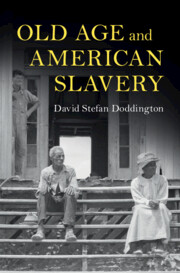Book contents
- Old Age and American Slavery
- Cambridge Studies on the American South
- Old Age and American Slavery
- Copyright page
- Dedication
- Contents
- Figures
- Tables
- Acknowledgments
- Introduction
- Part I The Enslaved
- 1 “As to those more advanced in life”
- 2 “Old and broken now; no tongue can tell how much I suffer”
- 3 “Young people think that old people are fools but old people know that young people are fools”
- 4 “Don’t kill such an old creature as I”
- 5 “You wont notice me now but you’ll wish you had”
- 6 “The summer of my life was passing away”
- Part II Enslavers
- Bibliography
- Index
1 - “As to those more advanced in life”
Old Age in Slavery
from Part I - The Enslaved
Published online by Cambridge University Press: 27 October 2023
- Old Age and American Slavery
- Cambridge Studies on the American South
- Old Age and American Slavery
- Copyright page
- Dedication
- Contents
- Figures
- Tables
- Acknowledgments
- Introduction
- Part I The Enslaved
- 1 “As to those more advanced in life”
- 2 “Old and broken now; no tongue can tell how much I suffer”
- 3 “Young people think that old people are fools but old people know that young people are fools”
- 4 “Don’t kill such an old creature as I”
- 5 “You wont notice me now but you’ll wish you had”
- 6 “The summer of my life was passing away”
- Part II Enslavers
- Bibliography
- Index
Summary
This chapter shows how enslavers were adept at assessing the temporal rhythms of the life cycle and adapting to the demands of embodied time in shaping their workforce. It shows how this flexibility stemmed from economic self-interest and a desire for dominance, and the severe cost of this for enslaved elders and the wider Black community. It first shows the types of jobs expected of elderly workers, and perceptions of managing a transition away from more active labors, before emphasizing how proslavery claims of a leisurely “retirement” for elders were rejected by the enslaved themselves. Enslaved elders could neither refuse nor deny the power of their enslavers to force them to continue their labors. Work, even if reduced, still had to be done upon pain of punishment, and enslaved people understood that the desire for profit that drove antebellum enslavers was enormously harmful to Black elders. As Lewis Clarke acidly recorded, “they hunt and drive them as long as there is any life in them.”
Keywords
- Type
- Chapter
- Information
- Old Age and American Slavery , pp. 33 - 71Publisher: Cambridge University PressPrint publication year: 2023

